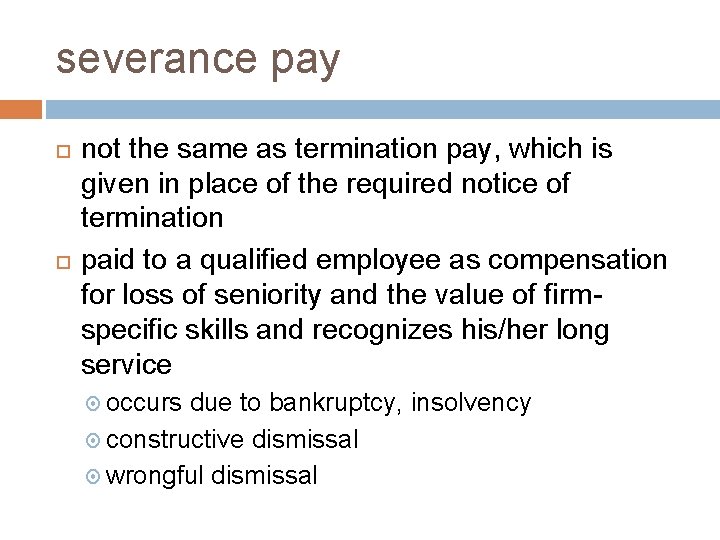Employment Law
In recent years there has been an increasing amount of employment law discussions revolving around the idea of ‘term or termination pay’. This is a concept that is currently being considered by the Employment Relations Authority (ERIA) in the UK. The idea behind this, and all other proposals, is that an employee should be paid for all the days they are expected to work after a notice period has ended. This process is said to give workers greater value for their money, allowing them to receive a fair amount for the days they have worked.
However, there are two main arguments put forward against this. The first is that by stipulating a shorter notice period employees will be forced to work longer, resulting in them having to work more days, which will mean more severance pay. The second argument is that by stipulating a longer notice period employees will be able to find alternative employment, therefore reducing the loss of employment and thus saving the employer money. The Employment Relations Authority is responsible for ensuring the UK’s employment law is complied with, and this has issued several guidelines on the payment of dismissal and other relevant facts. The main factor which is used to determine whether an employee should be paid or made to undergo unemployment counseling is what would be the same as losing that particular job during the notice period.
The short answer is that it depends. An employee may have agreed to a notice period of six months or more, but it is possible that this could be extended if there is a valid reason for doing so. If the employer has accepted an extension to the notice period then the employees are usually entitled to eight weeks of termination pay, but only after they have been given a further period of notice. A lot of people feel that a longer notice period gives them more time to find another suitable job; others believe it causes undue hardship on the employee, and both arguments have their points.
Website design By BotEap.com
Employment Law: Discharge Vs Settlements
It should be noted that there is a difference between the terms’settlement’ and ‘discharge’ that are commonly associated with severance pay and termination pay. Settlement is considered to be a much less favourable option in comparison to discharge, and is used as an employee’s last resort. For instance, a person could get up to a further twelve weeks of severance pay as a result of dismissal. However, this should only be accessed in the most extreme of circumstances, where there is not another alternative.
Discharge is a much less favourable option, which is generally used in cases where the employee has been unfairly dismissed due to illegal behaviour by a fellow employee. This can happen if an employee is found to have contravened company policy, whether through misconduct or neglect of their work. It can also be used following serious and widespread sexual harassment within a workplace. It is necessary to take into account any other employment law case that may involve similar facts; dismissal and discharge in these instances must always remain consistent with the rest of the Employment Law system. A discharge is usually given following a company being sued for breach of contract or unfair dismissal.
It should be made clear that the specific employment case at hand will determine which of these two sets of laws would be applicable to the case. It is therefore vital that legal advice is sought from an independent employment law solicitor, with regard to both settlement and discharge. Severance pay and termination pay are typically considered to be an employer’s right. However, the courts have recently allowed employers to claim workers who have suffered dismissal or redundancy as a direct result of illegal conduct by their fellow workers. This has caused many employers to seek advice from employment solicitor companies, with the intention of claiming unfair dismissal or discrimination via these professional bodies. Both sets of laws are complex, and can differ greatly from case to case.